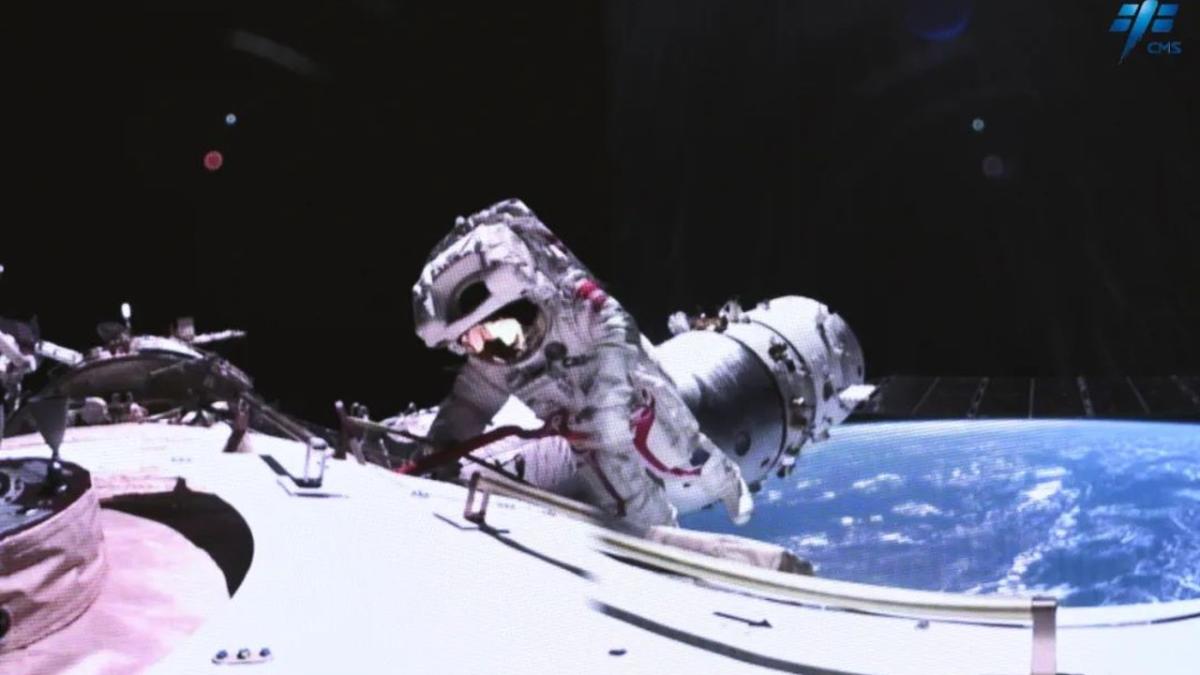China will strengthen its space debris procedures for astronauts following a partial power loss at its Tiangong space station, according to state media.
Astronauts from the Shenzhou 17 mission performed two spacewalks outside the Tiangong space station this winter, most recently on March 1. At the time, Chinese media said there had been a partial (but minor) loss of power supply after the outpost’s solar panels suffered a failure. debris strike.
These spacewalks were a success, the China Manned Space Agency (CMSA) said Wednesday (April 24) at a press conference reported by state media company Xinhua. The agency also plans to do more in the future to protect against problems with space debris in orbit.
“The Tianhe core module of the space station had suffered a partial loss of power supply due to the impact of the space debris on the power cables of the solar wing,” Xinhua reported, paraphrasing CMSA deputy director Lin Xiqiang.
Related: Watch Chinese astronauts repair Tiangong Space Station’s solar wing during an 8-hour spacewalk (video)
Xinhua did not specify whether the debris came from micrometeoroids or from human activity in space. Both types of debris pose a threat to Tiangong and the International Space Station (ISS).
Human-generated orbital debris is growing: The North American Aerospace Defense Command (NORAD) is tracking more than 43,000 space objects as of April 2024, according to SpaceTrack.org. As for active satellites, according to the Union for Concerned Scientists, there are more than 7,500 as of May 2023 — most of them members of SpaceX’s massive Starlink broadband mega-constellation.
ISS controllers, working with NORAD, have had to move the space station away from debris more than 30 times since the first modules were launched in 1998. The guidelines are strict and require a maneuver if debris gets into a “pizza box.” about 2.5 miles by 30 miles by 30 miles (4 by 50 by 50 kilometers) with the ISS at the center, according to agency officials.
China’s space station has also “carried out maneuvers several times to avoid the impact of space debris,” the Xinhua report said, and Lin discussed several measures the CMSA is taking to prevent future problems. (The first element of Tiangong, the Tianhe core module, launched in 2021.)
RELATED STORIES:
– How often does the International Space Station have to avoid space debris?
– US space science could fall behind China if private successors to the ISS are delayed, Congress warns
– Watch Chinese astronauts repair the Tiangong space station’s solar wing during an 8-hour spacewalk (video)
“China has increased its ability to accurately predict the orbits of the space station and small low-orbit targets, optimized its collision warning and avoidance procedures in space, and reduced the number of false alarms by 30%, Lin said,” Lin said. wrote Xinhua. without revealing details.
Upcoming measures include more video surveying of Tiangong using a high-definition camera on its robotic arm and ordering the Shenzhou 18 crew (expected to launch on Thursday, April 25) to deploy more reinforcements. They “will be tasked with installing space debris protection reinforcements for extravehicular conduits, cables and critical equipment during their extravehicular activities,” Xinhua reported.
NASA operates separately from China in the space field due to a 2011 directive known as the Wolf Amendment, which prohibits bilateral agreements and coordination between NASA and Chinese government agencies without express authorization from Congress.
Lately, NASA and China have been forming independent coalitions for lunar exploration: Nearly 40 countries have signed NASA’s Artemis Accords, with Sweden, Slovenia and Switzerland all joining in recent days. China, in cooperation with Russia, announced three new partners for its own coalition on Wednesday: Nicaragua, the Asia-Pacific Space Cooperation Organization and the Arab Union for Astronomy and Space Sciences.





